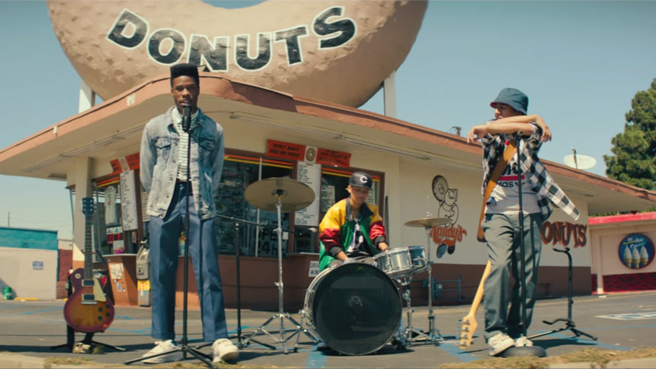Writer-director Rick Famuyiwa has struck the perfect chord with Dope, his first feature-length film since his 2010 flop Our Family Wedding (which received a painful 13% on Rotten Tomatoes). Famuyiwa has clearly learned from his mistakes. Critics panned Our Family Wedding as flat and mirthless—Dope is anything but. Every moment of the film is fun as hell, and what could have been a fairly run-of-the-mill teen comedy is elevated by its perfect pace and stellar performances.
Shameik Moore owns the screen in his first leading role as Malcolm, a geeky straight-A student and ’90s hip-hop aficionado who hopes to go to Harvard despite attending an underfunded high school in a violent part of Inglewood known as “The Bottoms.” Amid the stress of college applications and trying not to get shot, Malcolm and his friends Jib and Diggy (The Grand Budapest Hotel’s Tony Revolori and Transparent’s Kiersey Clemons, respectively) are unwittingly sucked into a drug ring and saddled with a massive amount of MDMA to unload.
Moore’s performance is the driving force of the film. His charismatic sincerity sells otherwise unbelievable scenarios and serves as the backdrop for the film’s more overtly comedic performances, such as Sean Combs progeny Quincy Brown’s manic rich kid rapper or Blake Anderson’s (Workaholics) drug connoisseur/hacker. Thankfully, Moore is not relegated to the role of straight man, which would have been a waste of his impeccable timing and gift for physical comedy—the scenes where Malcolm runs through the halls of his school, slipping on linoleum and tripping over stairs, are some of the film’s funniest.
Aside from a bizarrely inaccurate understanding of the college admissions process, Dope pretty consistently hits the mark in its representation of high school and Internet culture. It uses cultural touch points like bitcoins, Snapchat, and memes in ways that feel realistic and relevant to the story, a task that is exceedingly difficult to accomplish. What could have come across as pandering to its demographic (the kids like YouTube, right?) is not only inoffensive—it actually enhances the film’s plot. And technology isn’t the only thing the film gets right—the songs that executive producer Pharrell Williams penned for Malcolm, Jib, and Diggy’s band Awreeoh (pronounced “Oreo”) sound like the songs a pretty good high school band would actually perform.
Music factors heavily into the film, with Williams’ Awreeoh tracks comprising just one small piece of a stellar musical ensemble. The soundtrack is populated by Public Enemy, A Tribe Called Quest, and Gil Scott-Heron, and rapper A$AP Rocky landed a role as Dom, the drug dealer whose birthday party is the catalyst for Malcolm’s troubles. This musical current is part of what keeps Dope fun, and fun is vitally important to softening some of the film’s flaws. But fortunately, flaws are not Dope’s takeaway—its successes outshine them by a mile. FL









